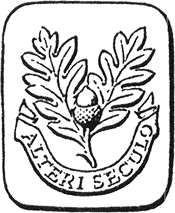By Rhonda Barlow, Adams Papers
In the summer of 1830, John Quincy Adams was preoccupied with two projects: planting trees on his properties in Quincy and reading the works of the Roman statesman and philosopher, Cicero, in the original Latin. Just two years earlier, in an 11 May letter to his son Charles Francis, John Quincy had lamented that he had not planted trees in his youth, for if he had, he could now enjoy their fruits and shade. He likewise wished he had read Cicero (106–43 B.C.) in Latin forty years earlier, when it would have been more profitable for his public service. He kept records of his planting and his reading in his Diary, which he had started in 1779, and by his death in 1848, filled 51 volumes.
On 14 August 1830, he started reading Cicero’s Tusculan Disputations, a philosophical treatise that began with “On the Contempt of Death.” In the midst of Cicero’s moralizing and speculation, a quote from the Roman poet Caecilius Statius leapt off the page:
Serit arbores quae alteri seculo prosint
John Quincy, writing in his Diary, made this translation from the Latin:
“He plants trees, says Statius… for the benefit of another century: for what purpose, if the next century were something to him? The diligent husbandman then shall plant trees, upon which his own eyes shall never see a berry? and shall not a great man plant laws, institutions, a Commonwealth?”
Cicero drew a comparison between the farmer and the statesman; but John Quincy was both. In his Diary, JQA followed his translation with this personal reflection:
“I have had my share in planting Laws and Institutions, according to the measure of my ability and opportunities— I would willingly have had more— My leisure is now imposed upon me by the will of higher powers, to which I cheerfully submit, and I plant trees for the benefit of the next age, and of which my own eyes will never behold a berry— To raise forest trees requires the concurrence of two Generations, and even of my lately planted nuts seeds and Stones, I may never taste the fruit— Sero arbores quae alteri seculo prosint.” Here John Quincy altered the Latin significantly, from Caecilius Statius’ “He plants” to “I plant.”
Having lost the 1828 presidential election to Andrew Jackson, John Quincy faced an early retirement from public life. He had passed from planting a republic to planting a garden. He could not forget the brief quote from Caecilius Statius. “Seculo prosint” kept appearing in his Diary as he cared for his trees. But within three months, he was elected to serve in the U. S. House of Representatives, and given a fresh chance to continue to plant laws for another century, another age, another generation.
In June 1833, President Andrew Jackson, was in Boston inspecting the local troops. While listening to the roar of the cannons in the distance, John Quincy, alone with his seedlings, proclaimed alteri seculo as his motto. The Latin phrase was a shout of triumph in the midst of defeat. His grandson, Henry Adams, recorded that JQA designed a seal, featuring an acorn and two oak leaves, and began using it to seal his letters. He even made a fob for his watch, and carried it everywhere (Catalogue of the Books of John Quincy Adams, Boston, 1938, p. 144–145).
This seal now adorns every volume of The Adams Papers, and appears on the website for the digital edition.


